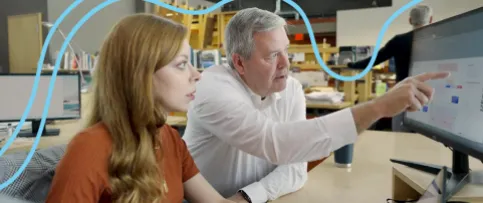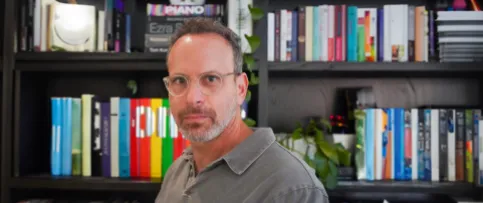Architect Gabriela Baierle-Atwood shares how she approached the Architect Registration Examination® (ARE®), her views on the path to licensure, and why mentorship matters.
What made you pursue architecture?
I wanted to be in an environment that uses sciences like math and physics, while depending on cultural studies like history and art. Architecture seemed to be the way to do both.
How did you approach your path to licensure?
I’m very much a go-getter kind of person, and I just wanted to be done with the exam. That was why I started early. It took me exactly two years to finish the ARE, including a couple of failed divisions and summer breaks. I focused intensely in the fall and spring months, usually testing within three to four weeks of beginning to study. I carved out time to study (reading and writing summaries) every weekday before work—I needed the days to be longer, so I started studying at 5 or 6 a.m. Then I spent evenings and a big part of my weekends reviewing and practicing multiple-choice questions.
How did you stay motivated to complete the ARE after facing a setback?
I had an amazing support system! There were a handful of times when I was ready to say, “I can’t do this” or “I’m not good enough,” and my family, friends, and mentors were kind enough to convince me otherwise. They believed in me more than I believed in myself—I am so thankful for them and hope I can be just as supportive of their endeavors.
Do you have any study tips for candidates preparing for the ARE?
My suggestion is to find your ideal schedule and methods of studying. It worked for me to be up early and study right away every day, but I know a lot of people who would never adapt to that. I also wrote a lot of summaries—that’s how I studied in high school and college, so I knew that method would work for me. I would also suggest talking to your employer or supervisor if you need to shift your schedule a little bit to accommodate valuable study time. A solid hour-long lunch break means one hour of straight-up studying in the middle of the day, for instance. Just focus on finding the study schedule and methods that best suit you as a test-taker.
You were a member of the 2015 Intern Think Tank. What were some of the insights you gained from that experience?
It was enlightening to get to know NCARB staff and to see first-hand how hard they are working to better our profession. Another valuable outcome has been the peer relationships we've built within the cohort—I am happy to have this group of people to lean into. We get to mentor each other and continue the collaboration, and that's priceless.
What do you think are the biggest conversations happening about the path to licensure?
How to streamline the process without compromising on the competency and fair evaluation that we as candidates deserve and want.
Why do you think it’s important to nurture the relationship between licensure candidates and their mentors?
The profession of architecture was founded on the grounds of mentorship—knowledge has been passed down from master to apprentice ever since society started to craft their built environment. Losing that, or even failing to reinforce its value, disregards that notion. I think people still crave to be mentored (and to mentor back), especially as technology increasingly informs the framework by which we produce work. I believe it’s worthwhile for us as architects to work toward continuing this culture.
You recently came to NCARB’s Annual Business Meeting. What did you think of your time there?
It was incredible. I was humbled by the opportunity, and I got to meet amazing people who are not only proposing tangible changes, but also seeing them through. One of the most valuable lessons was that it is possible to have a voice in this profession. There are many people putting in the time and energy to change things, and there is room for young architects to join that conversation. That became very clear to me after representing the ITT at the Annual Business Meeting. People were willing to listen and are interested in what our group proposed in a way I didn't foresee. That was very rewarding.
Why is licensure important to you?
Because I am an immigrant in the United States and unsure of what the future holds, pursuing licensure was a way to become the most credible professional I can be. I still have years to go in terms of earning experience, and I’m happy that my license will go hand-in-hand with that.
What’s next for you?
Keep getting involved! I plan to continue to listen to the current discourse and get more comfortable speaking up. I am pretty excited to be the AIA Massachusetts architect licensing advisor and to be participating in a handful of exciting committees at the Boston Society of Architects.
What advice do you have for licensure candidates?
Believe in yourself! You’ve got what it takes.
Gabriela Bairele-Atwood was a member of the 2015 Intern Think Tank and currently works at Wilson Butler Architects, in Boston, MA.



